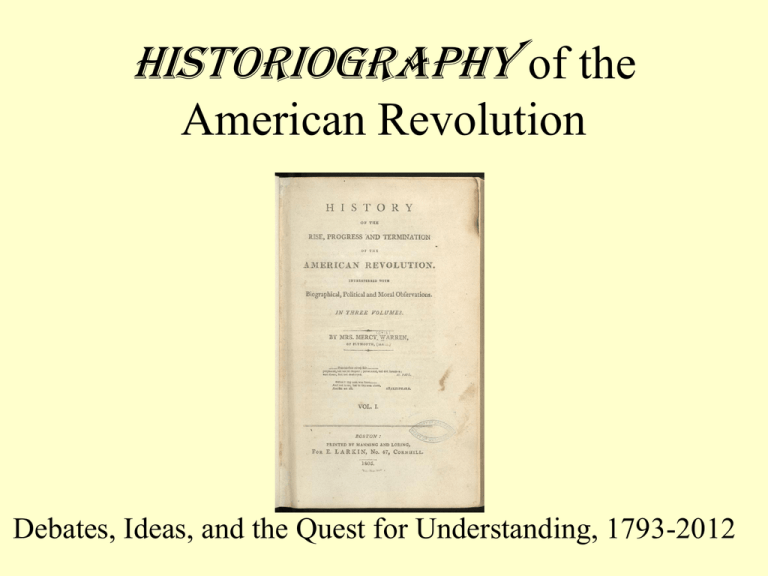HISTORIOGRAPHY of the American Revolution
advertisement

HISTORIOGRAPHY of the American Revolution Debates, Ideas, and the Quest for Understanding, 1793-2012 So what the !@#$ is Historiography • The study of the historical writing on a particular subject. • A cure for insomnia So what? • History is “a set of lies agreed upon by historians.” -Bonaparte • We’re all historiographers—struggle for control of official memory. • Are the colonists “rebels”, “patriots”, “freedom fighters,” or “self-interested elites?” • “Just the facts, mam.”—even straight narrative is an interpretation. Focusing on the origins of the American Revolution exclude much important stuff from consideration Basic Interpretations of the American Revolution • • • • • • • Comparative School Whig School Imperial School Progressive School Consensus School Neo-Whig School Neo-Progressive School • Recent Trends and Notable Books Comparative School • R. R. Palmer, The Age of the Democratic Revolution: A Political History of Europe and America, 1760-1800 (1959 and 1964) • Mlada Bukovansky, Legitimacy and Power Politics: the American and French Revolutions in International Political Culture (2009) • Willem Klooster, Revolutions in the Atlantic World: A Comparative History (2009) Whig School • American Revolution was “a movement for liberty in opposition to British tyranny.” • David Ramsay—History of the American Revolution (1793—2 vols.) • Mercy Otis Warren—History of the Rise, Progress, and Termination of the Revolution (1805—3 vols.) • George Bancroft—History of the United States (1834-1874—10 vols.) Mercy Warren and Geo. Bancroft Imperial School • Britain never intended to impose tyranny— Revolution was a function of trans-Atlantic misunderstandings, bureaucratic bungling, and Parliamentary mismanagement. • Herbert Levi Osgood—American Colonies in the 17th Century (1904-1907—4 vols.); American Colonies in the 18th Century (1924—4 vols.) • George Louis Beer—Colonial Policies (1907) • Charles McLean Andrews—The Colonial Background of the American Revolution (1924) • Lawrence Henry Gibson—British Empire, 17481765 (15 vols.) Progressive School • Self-interests compelled Revolution: “Conflicts between merchants and farmers, easterners and westerners, citydwellers and country folk, aristocrats and democrats, creditors and debtors” . . . “not so much home rule as who should rule at home.” • Charles A. Beard—An Economic Interpretation of the Constitution (1913) • Carl Lotus Becker—The Declaration of Independence (1922) • Arthur Meier Schlesinger—The Colonial Merchants and the American Revolution, 1763-1776 (1918) • Merrill M. Jensen-- The Articles of Confederation : An Interpretation of the Social-Constitutional History of the American Revolution, 1774-1781 (1959) Consensus School • Differences among white male colonists were minor—founders all supported a “liberal, Lockean ideal of a republic grounded on widespread property ownership and a state committed to fosterin individual rights and opportunities.” • Louis M. Hartz • Richard Hofstadter Neo-Whig School • Ideology was not pretextual; it was the real prism through which colonists interpreted the New Imperial Policy. • Bernard Bailyn—The Ideological Origins of the American Revolution (1967) • Gordon S. Wood—The Creation of the American Republic, 1776-1787 (1969) Neo-Progressive School • Despite a republican consensus, struggles between popular and elite forces drove the events of the era. • Gary Nash—Red, White, and Black: The Peoples of Early America (1974) Some among Many Notable Newer Books • Joyce Appleby, Capitalism and a New Social Order (Anson G. Phelps Lectureship on Early American History) (1984) • Gordon S. Wood, The Radicalism of the American Revolution (1992) • Marjoleine Kars, Breaking Loose Together: The Regulator Rebellion in Pre-Revolutionary North Carolina (2001) • T. H. Breen, The Marketplace of Revolution : How Consumer Politics Shaped American Independence (2004) • Alfred & Ruth Blumrosen, Slave Nation: How Slavery United the Colonies and Sparked the Revolution. (2005) • Colin Calloway, A Scratch of a Pen: 1763 and the Transformation of North America (2007) • Joseph J. Ellis, First Family: Abigail and John Adams (2010) • Michal Jan Rozbicki, Culture and Liberty in the Age of the American Revolution (2011) • Patrick Griffin, America's Revolution (2012) “Gotta say something about Gordon” 1933-





